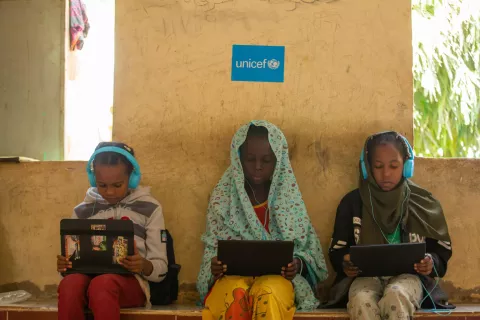From a troubled past to a bright future: A second chance for vulnerable adolescents in Kosovo
Recent juvenile justice reforms promise a second chance to children in trouble with the law

PRISTINA, Kosovo (SCR 1244) – G.P. was only 15 years old when he got into a serious fight with one of his peers. The conflict had started as a verbal disagreement, but in the heat of the moment, G.P. inflicted serious bodily injuries on the other boy. This type of physical altercation is considered a criminal offence by the Kosovo Juvenile Justice Code.
“It was all very complicated,” he says. “I got into a fight with my peers, and afterwards I felt so bad and sorry for what I have done. I’ve learned so much from all the mistakes I made that time,” says G.P.
Not so long ago, children like G.P. who were sentenced for criminal offences would have been sent to the Correctional Centre in Lipjan – Kosovo’s only juvenile detention centre – where they would have been detained until the end of their sentence.
However, since early 2004, UNICEF has been working with the Ministry of Justice to implement alternative measures as part of a new Juvenile Justice Code of Kosovo. These measures offer the possibility of putting children in conflict with law under the supervision of the Probation Service of Kosovo, while not depriving them of their freedoms set forth by the UN Convention on the Rights of the Child and other international standards.
The overall aim of the alternative or diversion measures is to promote the positive rehabilitation and reintegration of minors into their communities, while preventing future criminal behaviour. This path has many advantages over imprisonment: it empowers families and communities, protects citizens through an overall decrease in criminality, prevents radicalization, and helps affected children adjust and resocialize. “With all the available alternative measures, imprisonment should be the very last resort option, used only when all the other options are exhausted,” says Mustafa from the Probation Service of Kosovo.
An alternate path
Today, 19-year-old G.P. is a stable, bright young man studying economics at university, with no likeness to the rebellious boy he was four years ago. His adjustment is due in large part to the continuous work and close monitoring by the probation office. Instead of sending him to the Lipjan detention centre, he was assigned a probation officer, Ms. Fusharza Kelmendi, and was able to continue his daily activities and school.
“At the beginning he was very unstable and aggressive, in his way of talking and behaving. This might have been due to his age at that time, but he is really doing great now in all aspects and he didn’t have a single problem or conflict ever since,” Ms. Kelmendi says proudly. “He socializes with other students and is very active and engaged with different university initiatives.”
G.P. confirms that the alternative measures were extremely helpful, as they allowed him to continue with his daily activities and did not deprive him of his freedom.
“At the moment that the diversion measures were imposed on me, I started meeting with [Ms. Kelmendi], who talked to me about different issues, showing respect and understanding, and trying to help me to manage different situations with my family or friends. At our meetings she usually asked me all kinds of different questions like whether I’m going to classes or not, what challenges I faced” G.P. says.
“If I was sent to the correctional facility I would have had to stop my education and everything would fall out of order for me,” he adds.
G.P. plans to get his degree first and then help his dad’s business in selling construction materials. He will be under the supervision of probation service until July 2017.
UNICEF continues to provide technical expertise and policy advice to the Ministry of Justice and other stakeholders to ensure that equitable access to justice is fully embedded in Kosovo’s rule of law agenda.
Future actions will strengthen collaboration and coordination between judiciary institutions, municipal social welfare centres and the police to improve reintegration of young offenders. UNICEF is also working to improve data management systems, and to translate the newly revised juvenile justice code into systems and action for children and youth. UNICEF and the EU have joined forces with the Ministry of Justice to ensure that justice professionals in Kosovo have improved capacity to treat children in conflict and in contact with the law, including victims and witnesses, in line with the Convention on the Rights of the Child and international standards.
*All references to Kosovo in this story should be understood to be in the context of United Nations Security Council resolution 1244 (1999).



